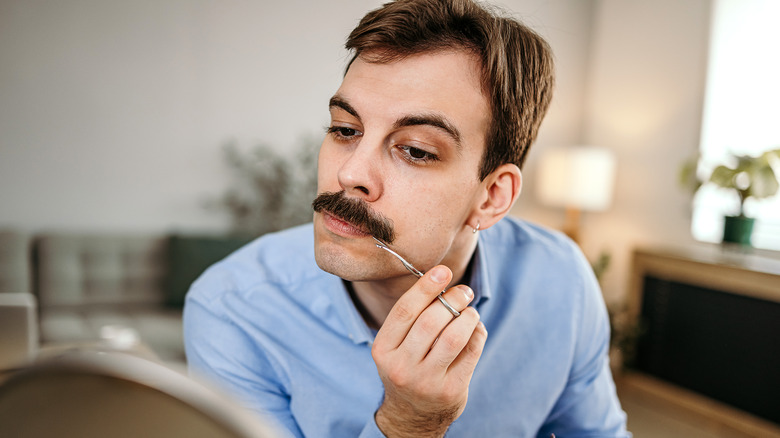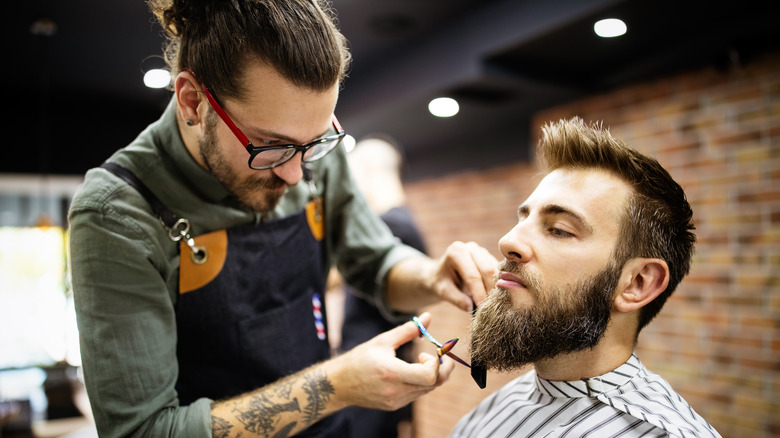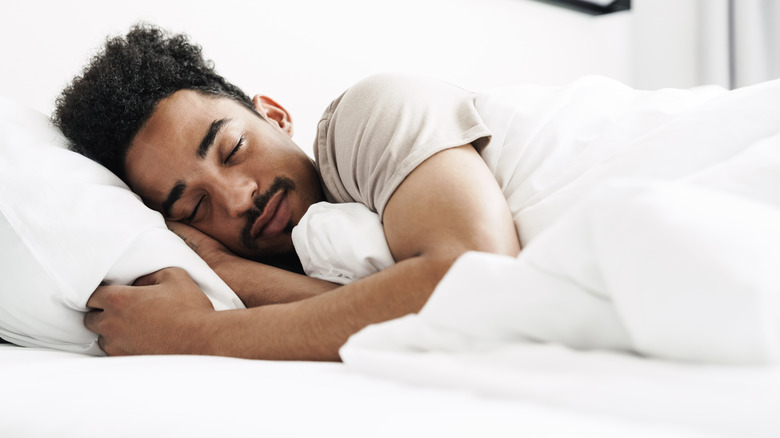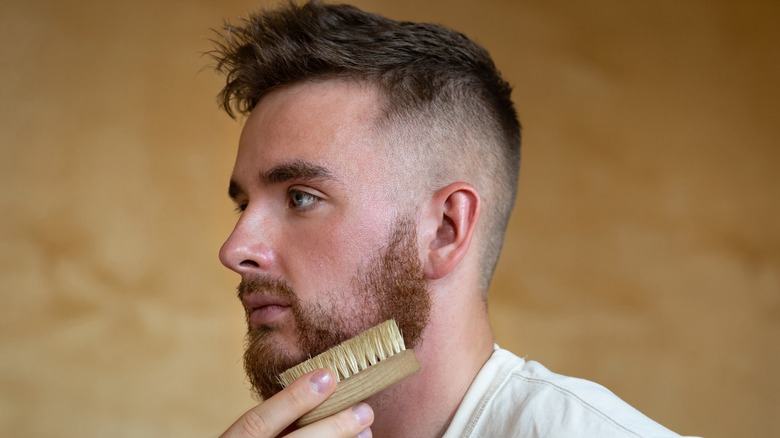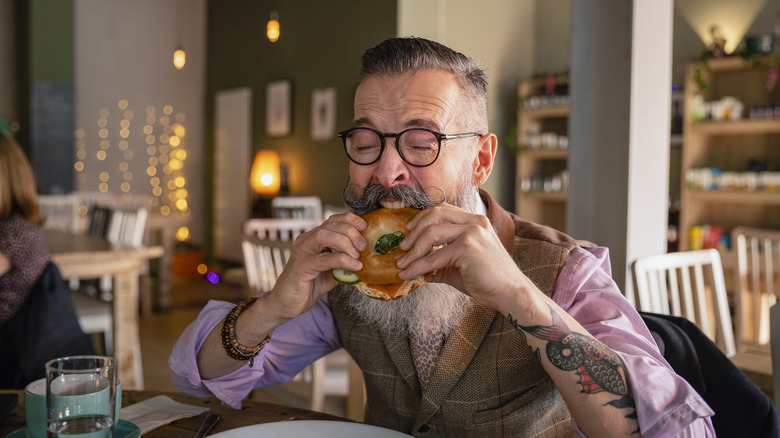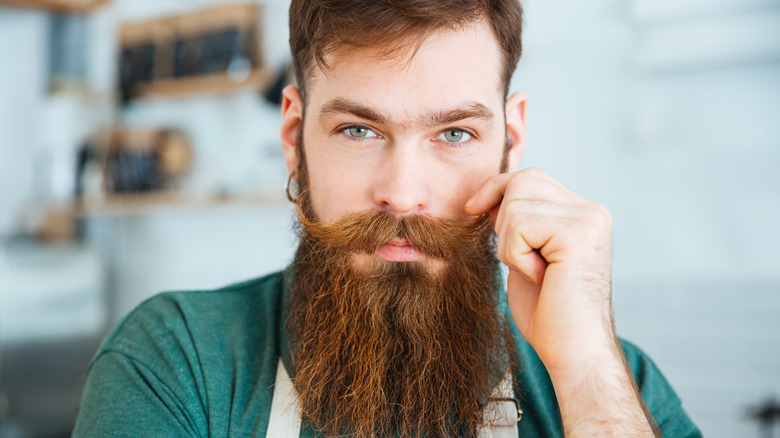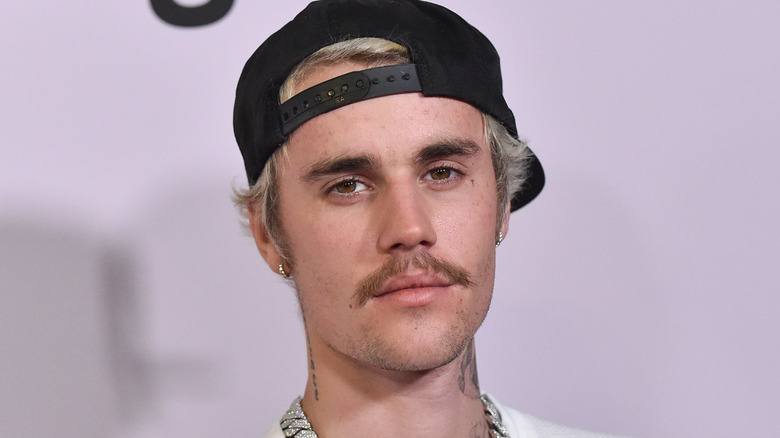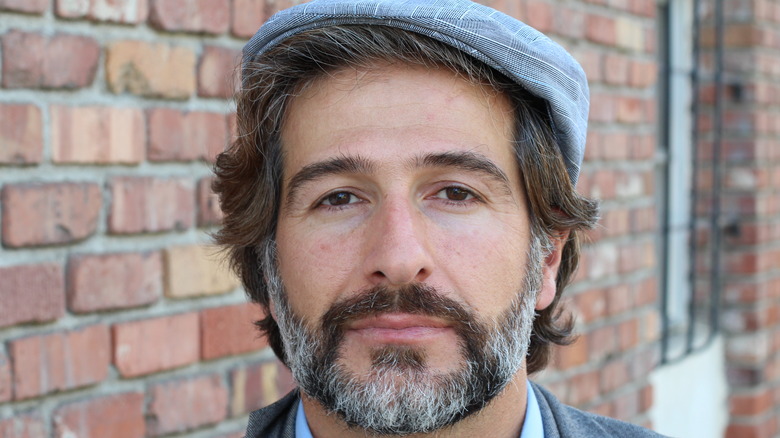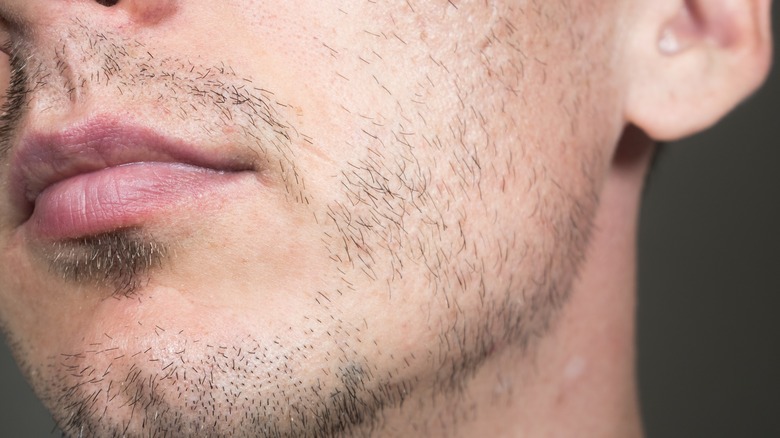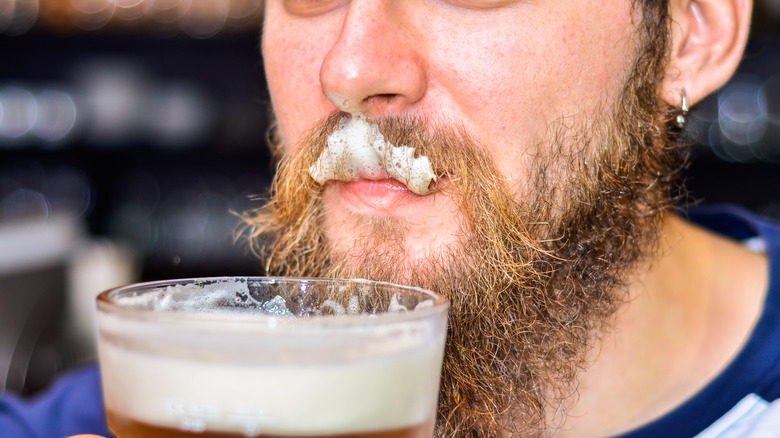Weird Scientific Facts About Your Mustache You Probably Didn't Know
We may receive a commission on purchases made from links.
You've noticed that some of your favorite celebrities, like Skyh Black, Justin Bieber, and James Franco, are rocking a mustache. You've been part of the 'stache club for a long time, but is there more to know about that facial hair than the fact that you groom it a lot? The facts and history behind those simple hairs on your face are fascinating.
Whether you love or hate them, mustaches are having their moment. Have you heard of Movember? Born in Australia, Movember is a movement to grow your mustache in November to raise awareness of prostate cancer, according to Reader's Digest. It's like "no shave, November," but with a purpose. It's boomed into a worldwide event you can find all over your social media and the news.
It doesn't have to be Movember for you to appreciate a mustache's unique beauty, though. Learn how to enjoy your facial hair by diving into some weird facts about your mustache that you might not know. There is much more science behind your mustache than you realize.
Mustache hair grows fast
You've probably noticed that your facial hair grows faster than scalp hair. This is especially true for those with a 5 o'clock shadow at noon. According to a 2016 study in the International Journal of Cosmetic Science (IJCS), facial hair grows at a rate of 0.3 to 0.5 millimeters every day. The research notes that this is twice as fast as the growth rate of your eyebrows. There are additional factors that play into this growth rate, like pigmentation. For instance, a white mustache will grow at a rate of 1.12 millimeters a day, about twice as fast. Environmental factors can also inhibit or help your growth.
According to Healthline, patience is vital if you're new to growing your facial hair. Facial hair grows fast, but it typically takes about two weeks to go from stubble to a mustache. Depending on the style of mustache you want, this can take even longer. Long mustaches are typically ready by the end of two months when your facial hair growing rate starts to slow. Remember that frequent trimming is essential to get the specific shape you crave.
Vitamin D deficiency can hinder your mustache growth
When trying to grow a beautiful, bushy handlebar mustache, ensure all your vitamins are in check. Specific vitamins are known to promote facial hair growth, and a deficiency can affect how your mustache comes in. Vitamin D has a lot of different functions within the body, but it's pivotal to hair growth.
Research appearing in the International Journal of Trichology in 2019 showed that vitamin D receptors in keratinocytes are needed to maintain a normal hair cycle, and it's an essential vitamin in regulating the body's immune response. So, this vitamin can significantly impact your mustache's growth if your levels are low. Vitamin D supplementation was also shown in a 2011 study published in Hormone and Metabolic Research to play a role in the level of testosterone in the body. Testosterone is needed for the growth of your mustache. So, if you're having trouble getting your mustache to sprout, try supplementing with vitamin D.
You can also add more vitamin D to your diet by eating foods that are rich in it, like salmon, tuna, egg yolks, and dairy. It will help your mustache meet new growth goals and make your body feel better in one shot.
Your mustache likes lots of sleep
It can be easy to see how much sleep impacts your body after a night of insomnia. But it goes beyond just making your brain foggy and your eyelids droopy. Sleep affects the health and growth of your facial hair.
Testosterone is vital to the growth of a rich, full mustache, so those with higher levels grow more facial hair. Therefore, it follows that anything that reduces your testosterone could affect the quality of your mustache. A 2011 study by the Journal of the Journal of the American Medical Association (JAMA) showed that not getting enough sleep had a negative impact on the testosterone of young, healthy males. It was noted that just a week of sleep restriction decreased their testosterone levels by 10% to 15%. Additionally, a 2017 study in The Journal of Urology found that men who had excessive daytime sleepiness due to working the night shift had lower testosterone.
Make sure to get a lot of quality sleep when you want to grow a luxurious mustache. The Mayo Clinic recommends that healthy adults should get at least seven hours of sleep per night to ensure their bodies are performing at their peak. However, this number can vary based on several different factors. Quality sleep also means you need to get rest with few interruptions so your body can hit the REM cycle.
The color of your mustache varies from your scalp hair
Genetics says a lot about you, including the color of your mustache. While you might be sporting brown tresses, your mustache might come in red. Having facial hair that's a different color than the hair poking out of your scalp is due to a gene mutation of the MC1R gene. According to MedlinePlus, this gene instructs the protein receptor responsible for pigmentation.
Specialist Petra Haak-Bloem from Erfocentrum, a Dutch genetics center, told Vice that when you get one mutated MC1R gene, you can have a red mustache but brown hair. And it doesn't mean that your father had a red beard, either. Petra Haak-Bloem explained, "Generally speaking, people inherit hair color not only from their parents, but also from their grandparents and earlier ancestors. So it's entirely possible that one distant ancestor had a hair color that suddenly appears again though [through] a certain combination of genes."
Additionally, the pigment of your mustache will have variations due to the melanin type. That's why you might have random dark areas or even wisps of black hair. As you get older, some of those hairs even start to turn gray.
Certain foods can make your mustache grow in fuller
You've been trying to grow out your mustache and haven't gotten much past the pencil 'stache phase. You, however, would like to grow a Tom Selleck mustache that will make all your friends envious. Your diet can play into getting a rich mustache that curls around your upper lip.
Low testosterone can work to hinder your mustache-growing journey. While a severe deficiency might mean you need to make an appointment with your doctor, you can add foods to your diet that help increase your blood testosterone levels. Healthline says a few testosterone-boosting foods include fatty fish, avocados, eggs, and dark leafy greens. In addition to helping your mustache look impressive, they can also help to naturally boost your sex drive and increase your blood cell production.
You might also want to ensure you're eating foods rich in B vitamins — especially B7 (biotin) — like eggs, fish, and nuts. Biotin is shown to help stimulate the production of keratin for follicle growth, according to CNET. The vitamin C in that grapefruit you have in the morning can also help to keep those free radicals that might bother your follicles in check.
You mustache provides built in sunscreen
So, you might not think of your mustache as a sun bonnet for your lip, but it's working to keep those harmful UV rays off your delicate skin. A 2012 study in Radiation Protection Dosimetry used mannequins with glue-on beards to see how well facial hair can keep the UV rays from getting to your delicate skin. The facial hair areas with hair received a third of the amount of exposure than the bare skin did. While these findings depend on the amount of hair and how it grows, that's still a good amount of protection. Move over sunscreen!
Dermatologist Dr. De Fiori told Medical Daily, "A beard protects against skin cancer by blocking and absorbing UV light in the same manner as a physical sunscreen ingredient (i.e., zinc oxide or titanium dioxide)." However, just because your mustache will protect the skin of your upper lip doesn't mean you want to skimp on sunscreen. Ensure that you use sunscreen on other areas of your face and body, too. The Skin Cancer Foundation recommends applying a nickel-sized dollop of sunscreen to your face and making sure to rub it in well.
You touch your mustache a lot
People around the world have their own different quirks. You might be one who taps your foot when you're nervous or plays with your hair. If you have a mustache, you might be more apt to stroke it when you're bored or feeling a bit nervous. Allan Peterkin, author of "One Thousand Mustaches: A Cultural History of the Mo," states in the book that mustache connoisseurs stroke their 'stache about 760 times a day.
That might seem like a large number for giving your mustache a good pat, but you actually touch your face quite a lot during the course of a day. A 2015 study in the American Journal of Infection Control found that individuals touch their faces about 23 times an hour. So that means that the average person touches their face about 552 times in a 24-hour period. Mustache wearers are a little ahead of the game, but they've got grooming time in there too.
Since you can't seem to not stroke your precious 'stache, consider adding a bit of mustache oil in the morning to make sure all the hairs are good and saturated. This will ensure that all that touching doesn't affect the skin underneath. You'll also want to make sure that you're washing your hands frequently to ensure that you aren't transferring any nasty germs from your fingers to your mustache, according to the Centers for Disease Control and Prevention.
Mustaches play a role in sex appeal
It's not surprising that every person has a specific type that they find attractive. Science has proven, however, that mustaches and beards play a role in the overall attractiveness of men to their mates. A 2016 study published in the Journal of Evolutionary Biology found that women find men with facial hair more attractive than those with clean-shaven faces. The study showed that heavy stubble was the most attractive trait, and there was an interaction between facial masculinity and beardedness.
It's not just among heterosexual females, though, that this preference for a bit of facial hair is found. A 2017 study by Evolution and Human Behavior showed that homosexual males also preferred men with facial and body hair. The study did note that males typically preferred men who were hairier more than women did. So, it begs the question about what having a hairy upper lip or beard has to do with sex appeal.
Dr. Allan Peterkin told Esquire there is more to the mustache than just sex appeal. It works to make men feel more masculine. The doctor discusses how the mustache reappears throughout history when male masculinity is feeling threatened. His example is that Justin Bieber and several other known artists (referenced as a current guide for sexiness) are rocking a mustache. In it's new dawn, the mustache is redefining male masculinity.
Gray hair sprouts in your mustache before on your head
The different hairs on your body have different growth cycles. You might have noticed that your scalp hair grows differently than your facial hair.
The life cycle of any hair is divided into three distinct phases, according to StatPearls. The anagen phase is when the hair is actively growing on your upper lip. The IJCS study authors note that 85% to 90% of facial hair is in the anagen phase at any given time. Given that mustache hair doesn't typically grow as long as scalp hair, it reaches a point where it goes into the catagen phase, which is the hair transition phase. It then hits the telogen phase, where it stops growing and sheds. The hair on your scalp takes years to stop growing, but your facial hair is faster.
So, your beard and mustache can start to sprout silver hairs before the hair on your scalp. Additionally, white hairs on the face grow twice as fast as those with pigmentation. Once those beauties start coming in, you'll typically notice more of them. A 2012 study in the British Journal of Dermatology notes that 74% of people were affected by gray hair between the ages of 45 and 65. And men were significantly grayer than the women in the study. Given the higher rate of gray among men and how gray facial hair grows, you could have a white mustache but just wisps of gray on your head.
Baldness can affect your mustache
Male pattern baldness is a common occurrence in society. Baldness doesn't just affect your head, however. There is a specific type of baldness that can affect your 'stache. Alopecia barbae is a particular loss of hair where your immune system works to attack the follicles in your face. According to Healthline, the patches of hair loss typically occur within a circular pattern in your mustache and beard. It was noted that baldness was most common along the jawline, but your cells can potentially attack all the hair on your face.
The condition typically occurs suddenly, and the hair is lost within a few days or weeks. The hair can also turn white around the edges of the bald areas. According to Wimpole Clinic, the condition's cause isn't well understood, but there seems to be a failure in the body's T-cells. Additionally, American Family Physician suggests that alopecia, including alopecia barbae, can have a genetic factor.
Treatment can take many different forms, but since this is an autoimmune response from the body, it has been known to go into remission by itself. Other treatment options to discuss with your healthcare specialist include cortisone shots and minoxidil, a hair growth cream known by the brand name Rogaine. You might even try immune inhibitor treatments, which have been proven effective for alopecia areata, a general baldness disorder (per Wimpole Clinic).
You're losing drinks to your mustache
All it takes is a quick stroke of your mustache to realize the hairs are rather large. The IJCS study notes that mustache hairs have more cuticle layers than hairs on your scalp. This makes them twice the diameter of your head's hair and a bit more porous. In addition to needing more force to get them shaved, you can also lose drinks to your mustache hair.
Research done by Guinness showed that mustached drinkers are losing 162,719 pints a year due to their mustaches (via The Guardian). Just one mustached patron will lose at least a pint to their facial hair. Now that's a lot of beer! A Robin Dover, a specialist in hair science and dermatological conditions, told The Guardian that the average mustache can absorb 20% of its weight. So, you aren't just losing beer in there but any liquid you consume. This makes your mustache a great napkin for catching all those drips and spills. It also means it's essential to make sure you clean it well at the end of the day.
Facial hair can be fascinating. Your mustache is more than just a few hairs on your upper lip; it's a part of your identity. Now it's time to share your new mustache knowledge with friends.

